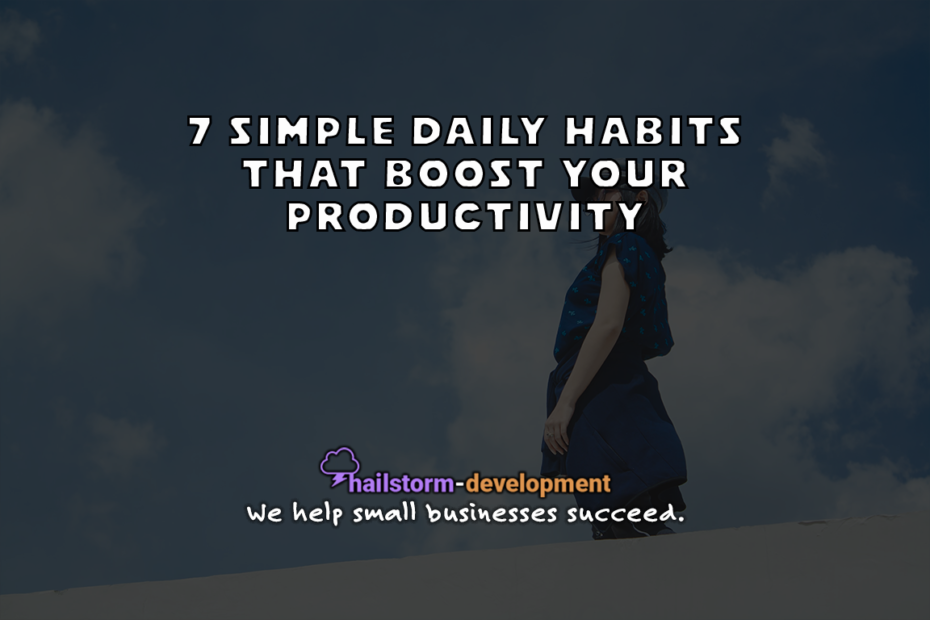Boost Your Productivity
Did you know that by making small changes in your daily routine, you can boost your productivity? That’s right – by analyzing and optimizing your day-to-day operations, you can set yourself up for success throughout the work week, no matter what is standing in front of you.
Kickstart Your Productivity with 4 Quick Tips
- No Procrastinating
- Identify Time Bandits
- Be Kind to Yourself
- Tailor the Suit to Fit You
Procrastination can affect anyone. In fact, sometimes it can lead to avoiding projects or related work. On the other hand, it can also look like perfectionism – where you are never satisfied with your work. Whether or not it’s at the point where you begin to make excuses (or maybe you’ve been making them for a while now), procrastination can be dealt with healthily. Starting with your focus, consider what you spend the most time avoiding, and how you can improve that behavior.
Have you ever been so engrossed with your work that you completely lose track of time? A 15-minute investigation has now diverged into a full-blown task, and you’re already through half of the estimate. When this occurs, it is good to take a step back and try to identify areas in which you spend large chunks of time. Do you notice a pattern? Close examination of your daily work can point out areas in which you can improve – either by asking a teammate for help or by shifting to a task you’re more comfortable/familiar with.
In addition to thinking differently, productive people also avoid thinking about all the things they won’t be able to get done. Further, they challenge their thoughts and ask themselves questions like:
- I need to do this and this. What’s the best way for me to get everything done?
- What’s causing my stress, and what needs to change so that I can manage it better?
- What can I do to improve this, considering the situation?
Lastly, some use positive affirmations as a form of positive self talk to help them maintain their motivation.
Learning to manage your time effectively may work for most, but it’s definitely not a one-size-fits-all. An analogy that can help to illustrate this is purchasing a suit. When shopping for a suit, adjustments need to be made to fit your body. The same thing can be applied to time management: sometimes, the selected strategy doesn’t work for you.
Habits to Boost Your Productivity

Productive individuals generally have an idea of what tasks they are juggling, as well as the priority of each. With a clear outline of what deliverables are expected, you can focus on the first thing in your list first, and plan for completing the remaining work.
With more and more people working from home, the likelihood of using multiple monitors increases. For example, I can work on writing acceptance criteria on one screen, while attending a meeting and displaying it on the other screen. Initially, this may seem efficient, but will lead to errors as you are not 100% focused on either task at hand.
In reality, while you may want to take on every project that comes your way, it’s important to understand your current and future workload. Above all, it is important for you to say “no” to projects when you are close to or are already over your capacity.
In Conclusion
Ultimately, like most things, applying a strategy to boost your productivity isn’t a cookie cutter model. It may take a few different iterations of strategies before you find the perfect fit. Do you have any tips or tricks for staying productive? Let us know in the comments below.
Resources & Further Reading
Elias, B. (2021, March 01). 18 habits of highly Productive people: What efficient people have in common. Retrieved March 26, 2021, from https://www.activecampaign.com/blog/habits-of-highly-productive-people
O´Donovan, K. (2021, March 17). How to be Productive: 4 tiny tweaks to make in life. Retrieved March 26, 2021, from https://www.lifehack.org/articles/productivity/more-productive-4-ways-that-really-work.html
Van Edwards, V. (2020, August 04). 14 unique productivity TIPS: How to be more productive with less effort. Retrieved March 26, 2021, from https://www.scienceofpeople.com/productivity/
